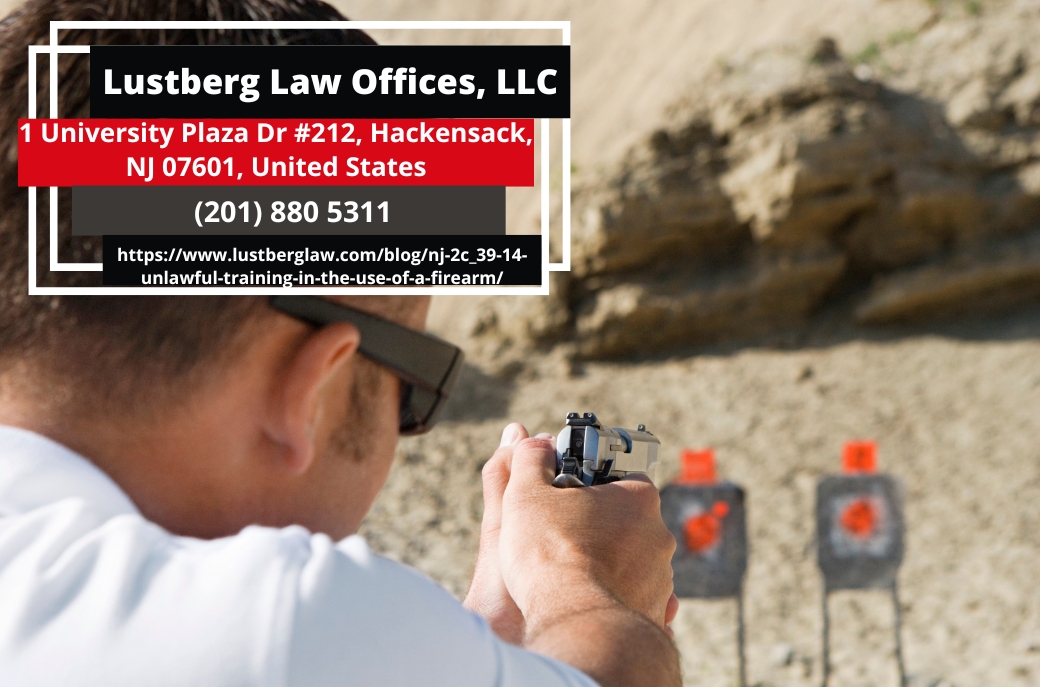New Jersey gun crime lawyer Adam M. Lustberg (https://www.lustberglaw.com/blog/nj-2c_39-14-unlawful-training-in-the-use-of-a-firearm/) is drawing attention to a significant but often overlooked state law, N.J.S.A. 2C:39-14, which outlines strict criminal penalties for unlawful firearm training. The statute targets individuals who instruct or train others in the use of firearms, explosives, or similar devices when the purpose is to support or facilitate criminal acts. Even if a crime has not yet occurred, the law imposes harsh penalties on those involved in such training activities with unlawful intent.
Lustberg, who represents clients across New Jersey as a gun crime lawyer at Lustberg Law Offices, LLC, notes that violations of this law can carry serious consequences, including second-degree felony charges. The statute's reach is broad, covering not only direct instruction but also group training sessions that mimic paramilitary activities. As a New Jersey gun crime lawyer, Lustberg warns that the consequences can extend well beyond prison time, potentially affecting future employment, housing, and immigration status.
Adam M. Lustberg, a New Jersey gun crime lawyer, highlights that the law is rooted in preventing organized violence or terroristic plots. "The legislative intent of N.J.S.A. 2C:39-14 is to prevent the formation and operation of private groups preparing for violent or terroristic acts," Lustberg explains. Originally enacted in 1983 and later amended in 1988, the statute aligns with New Jersey’s broader efforts to keep military power in check under civilian authority. This legal framework targets behavior not addressed by general conspiracy laws—specifically the act of training others to commit crimes involving weapons.
N.J.S.A. 2C:39-14 criminalizes both individual and group activities. Individuals who knowingly or intentionally instruct someone in using or constructing firearms or explosives for criminal purposes face second-degree charges. Similarly, assembling with others to drill or train in tactics intended for unlawful use is also prosecutable under this statute. According to Lustberg, the law particularly focuses on gatherings that resemble private militias or extremist groups, which law enforcement views as public safety threats.
It is important to note that the law does not prohibit lawful firearms training. Activities like gun safety classes, recreational shooting, and martial arts remain legal provided there is no intent to use the instruction for unlawful acts. The intent requirement is central to this statute. Lustberg points out that teaching someone to shoot for sport or helping a homeowner with firearm safety is fully permissible, but that same training could become illegal if it's clear that the knowledge will be used for a crime.
Penalties for violating N.J.S.A. 2C:39-14 are severe. As a second-degree felony, it carries five to ten years in prison, fines up to $150,000, and a presumption of incarceration—even for first-time offenders. The law falls under the Graves Act, New Jersey’s stringent firearm sentencing legislation, which mandates minimum parole ineligibility terms and restricts bail and early release options. These sentencing structures significantly limit judicial discretion, making it difficult for defendants to avoid prison time if convicted.
Beyond incarceration, the long-term impact of a conviction is extensive. A felony record under this statute can lead to loss of gun ownership rights, employment difficulties, and trouble with professional licensing or housing. For non-citizens, it may be classified as an aggravated felony under federal immigration laws, potentially leading to deportation or barring access to legal relief options.
Lustberg emphasizes that N.J.S.A. 2C:39-14 is distinct from other New Jersey weapons laws. Unlike statutes focused on unlawful possession or direct use of weapons, this law targets instructional and preparatory conduct. For example, someone lawfully possessing a firearm could still face charges under 2C:39-14 if they train someone for illegal purposes. It also differs from trafficking laws, which center on the sale and distribution of firearms rather than instruction or preparation.
There are legal defenses available to those charged under this statute. One primary defense strategy involves challenging the intent element—prosecutors must prove the defendant knowingly trained someone for criminal purposes. According to Lustberg, demonstrating that a defendant believed the training was for lawful self-defense or sport can be an effective argument. Other defenses might question whether actual instruction took place or assert constitutional protections such as free speech or freedom of association. In some cases, defendants may also argue entrapment, particularly if law enforcement played a significant role in initiating the activity.
When legal defenses are limited, negotiated resolutions may offer a path to reduced charges or sentencing. Lustberg notes that prosecutors may be open to plea deals in cases with weak evidence of criminal intent. In rare situations, defendants may even qualify for Pre-Trial Intervention, which could allow them to avoid incarceration entirely if no actual harm occurred.
Facing charges under N.J.S.A. 2C:39-14 carries serious risks that demand strong legal representation. Adam M. Lustberg of Lustberg Law Offices, LLC has handled numerous firearm-related cases and works to protect clients from the harsh penalties imposed by this statute. As Lustberg explains, even lawful gun owners can find themselves in legal jeopardy if their actions are misinterpreted as criminal training efforts.
Laws like 2C:39-14 reflect New Jersey’s strict approach to gun control and public safety. The consequences for those accused under this statute can be severe and long-lasting. For anyone facing investigation or charges related to unlawful firearm training, understanding the law and acting quickly is essential.
About Lustberg Law Offices, LLC:
Lustberg Law Offices, LLC represents clients throughout New Jersey in criminal defense matters. Led by attorney Adam M. Lustberg, the firm handles a range of legal issues including gun crime charges, with a commitment to defending client rights and seeking favorable outcomes in cases.
Embeds:
Youtube Video: https://www.youtube.com/watch?v=CygqbHRLLH8
GMB: https://www.google.com/maps?cid=17248268094099978177
Email and website
Email: alustberg@lustberglaw.com
Website: https://www.lustberglaw.com/
Media Contact
Company Name: Lustberg Law Offices, LLC
Contact Person: Adam M. Lustberg
Email: Send Email
Phone: (201) 880-5311
Address:One University Plaza Dr Suite 212
City: Hackensack
State: New Jersey 07601
Country: United States
Website: https://www.lustberglaw.com/




